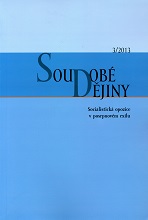Mýty a legendy o nuceném vysídlení Němců. Zásadní analýza německého „vzpomínání a zapomínání“
Myths and Legends about the Expulsion of the Germans: An Essential Analysis of German ‘Remembering and Forgetting’
Author(s): Petr ŠafaříkSubject(s): Review
Published by: AV ČR - Akademie věd České republiky - Ústav pro soudobé dějiny
Summary/Abstract: HAHN, Eva – HAHN, Hans Henning: Die Vertreibung im deutschen Erinnern: Legenden, Mythos, Geschichte. Paderborn – München – Wien – Zürich, Schöningh 2010, 839 stran. This is a review essay of a Czech translation of a recent work by Eva Hahn and Hans Henning Hahn, whose title means ‘The expulsion in German memory: Legends, myths, history’. The reviewer presents the authors, both renowned historians and intellectuals, who have, with journalism and other public involvement, participated in current debates about the expulsion of the Germans from central and eastern Europe after the Second World War. He then presents the main points of their book in the context of historical research and the wider political and social reflections on this subject in Germany and the Czech Republic. He considers the leitmotif of the Hahns’ book to be the well-argued thesis that in the Federal Republic the statesupported official policy of the memory of the expulsion of the Germans does not correspond to the knowledge of specialists. With appreciation, he acquaints the reader with the unusually wide scope of the book, which includes the historical facts of the migration of the German population from central and eastern Europe in their complexity (in other words, not only the post-war expulsions, but also earlier escapes and also Nazi-organized transfers) and also, indeed mainly, the genesis of the collective memory of these events in West German politics, history writing, and the mass media, especially amongst the expellees. With an analysis of the expulsion discourse, drawn from a wide range of writings, the authors have found in the German collective memory the repetition and survival of stereotypical views that originate in German Romantic populist (völkisch) or even Nazi rhetoric. Despite his overall high opinion of the publication, the reviewer finds some weaknesses it. The passages about coming to terms with the past, he argues, fail to consider the expulsion of the Germans in the context of international law. Regarding the passages in which the Hahns criticize the revisionist claims of West German politicians, a question remains about the extent to which this rhetoric was influenced by particular forums and occasions at which it was heard. The Hahns’ criticism of the terminology used in Germany to discuss the expulsion is then turned against the two authors by the reviewer. In his conclusion, he focuses on the reception of the book in Germany. Though he finds that the responses to the book have been predominantly positive, on the whole he sees the reception of the book there as not particularly striking. According to him, the book has the potential to inspire further debate, but could also serve as a compendium. It will be useful to Czech readers because it analyses many phenomena present in Czech thinking about contemporary history, and not only in connection with the expulsion of the Germans.
Journal: Soudobé Dějiny
- Issue Year: XX/2013
- Issue No: 03
- Page Range: 415-444
- Page Count: 30
- Language: Czech

